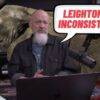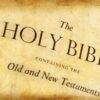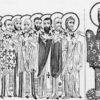Tag: Reading
On a James Whitean and Leighton Flowersian Naked Reading of the Bible
Thumbnail created originally by Leighton Flowers (Caleb) I was listening to James White live today on his Dividing Line vlogcast, and what he reinforces over and over is that he is what some are calling a ‘biblicist,’ or what I would identify as a solo Scriptura or nuda Scriptura proponent, as far as the way that he approaches Scripture. In this way, James White and his archnemeses, Leighton Flowers, ironically affirm the same bibliology and its attending hermeneutic. It is both modern, postEnlightenment, and Lockean (i.e., tabula rasa) in orientation. That is, it sees Scripture and its reception in a…
Reading the Bible as a Christian: The Outer and Inner Reality of Scripture
Scripture has an outer logic and an inner logic. Back in the day this was referred to as its outer and inner clarity (perspicuity of Scripture). In some ways the rift between the disciplines of biblical studies and systematic theology pivots on which one of these the practitioner is focused on. That is to say, the biblical studies folks, typically focus on the outer components of the text; i.e., its grammar, philology, sitz im leben (e.g., historical situadedness), composition, transmission, and other “text critical” factors. Whilst the systematic theology folks focus more on the inner-theo-logic of the text; attempting to…
An Apology for Reading Deep Theology, Beyond Nerdom
This is no secret: I read lots of what would be considered “academic theology.” The thing is, I don’t read it to be an academic, per se. The thought occurs to me that there are many out there who read and do theology for purely academic reasons. But you don’t have to. You can read academic theology simply to grow in the grace and knowledge of Jesus Christ; to be active in the sanctification process, as the Holy Spirit blows and kindles the fire of Christ’s love upon our new hearts of ‘flesh.’ It is true, some might mistake you…
A Christological Reading of Holy Scripture Contra the neo-Marcionite “Bible Teachers” of the 21st Century
Let me be forthrightly clear: to follow a Christologically conditioned reading of Holy Scripture is not to be, at the same time, an implicit Marcionite. It is also not to suggest that the Old Testament history is simply the Hebrew peoples’ progressive knowledge of God, and thusly their writing thereof, as if it isn’t in fact heilsgeschichte, or the story of God’s in-breaking activity all throughout ‘salvation history,’ providentially and actively orienting and working through the events of said history in order to eventuate the actualization of his pre-destination in Jesus Christ to be for the world and not against…
An Athanasian Reformed Reading of John 6:44-45: On Unconditional Election and the Effectual Call
There was a debate, very recently, between Dr. James White and Dr. Leighton Flowers with reference to John 6:44-45. The theological locus under disputation was on the Calvinist doctrines of unconditional election and the effectual call. White argued the positive position, i.e., affirming unconditional election and the effectual call; whilst Flowers argued the negative, i.e., denying unconditional election and the effectual call. For the purposes of this post, I am just going to assume the reader understands the entailments of said doctrines, and cut right to the chase in offering the Athanasian Reformed (AR) (Evangelical Calvinist) reading of John 6:44-45….
Reading the Prodigal Son Story as an Illustration of a Familial Rather than Legal Relationship
Here at Athanasian Reformed we often talk about soteriology; indeed, as a nexus interlinked with a whole host of other theological loci, within a theological taxis (order). I was once again reminded by someone on X/Twitter that not everyone thinks these matters through the inner-theological reality present within the warp and woof of Holy Scripture; they simply skim the outer-textual-top and think they have somehow penetrated the marrow therein. But as is the case, the biblical marrow is only gotten at when the reader understands the Bible’s res (reality): i.e., Jesus Christ. When Scripture is “exegeted” through a Ramist place…
On Reading Scripture as a Foreigner
Reading Holy Scripture is an exceedingly dialogical event. That is to say, reading Scripture takes place in the relationship that co-inheres between the divinity and humanity of Jesus Christ for us; it is a con-versational happenstance that reposes in the context of God’s eternal and triune life. This entails that as the Christian reads the Bible they are engaging in an organic and inter-personal contact with the very author of said readings. As Jesus said: He would not leave us as orphans, but send us the Holy Spirit; the Comforter, the come-along-sider who will bring us into all truth; who…
Three Vignettes on Reading Scripture Theologically Among the Evangelicals
The following are three vignettes on Theological Exegesis or Theological Interpretation of Scripture (TIS) that I just posted today on Facebook. I think, in the main, so many Christians are so far removed from all things theological or actual, when it comes to excavating the reality of the faith once and for all delivered to the saints, that when some do attempt deep dives into such things they simply attempt to apply “common-sense” everyday linguistic and cultural reading theories onto the text of Scripture that Scripture itself resists. Scripture is Holy because its reality is in Jesus Christ. Scripture is…
The Pressure of Triune Revelation on the Composition and Reading of Holy Scripture
The various phenomena referred to in Holy Scripture, is the same phenomena we experience currently in the world. The world of the Bible, not its ANE (ancient near eastern) parallels, is definitive in regard to the way we think about the world. To use extrabiblical data, and read that into the “gaps” of Scripture, is neither safe nor sound. To speculate is to go beyond the things that have been revealed by God (Deut. 29:29). There is an inner-logic to Scripture, but that is biblical not speculative. This is not to say that gaining an understanding of ANE and Second…
Reading Scripture with the Christological and Trinitarian Grammar
This is from chapter 4 of what I presented for my PhD dissertation to Concordia Academic Theology Consortium. As many of you know I gave back that PhD. I am still working on the dissertation (to refine and add to it further), as it looks like it will be considered for another PhD (possibly) at an accredited school. Anyway, here’s a little excerpt: . . . I contend that since all orthodox Christians, in every place, operate with these conciliar categories—two natures/singular person—with reference to Jesus Christ, that it is this fortification, these grammatical loci, that fundamentally give hermeneutical shape…







